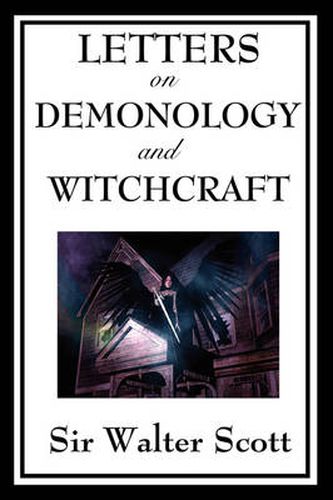Readings Newsletter
Become a Readings Member to make your shopping experience even easier.
Sign in or sign up for free!
You’re not far away from qualifying for FREE standard shipping within Australia
You’ve qualified for FREE standard shipping within Australia
The cart is loading…






This title is printed to order. This book may have been self-published. If so, we cannot guarantee the quality of the content. In the main most books will have gone through the editing process however some may not. We therefore suggest that you be aware of this before ordering this book. If in doubt check either the author or publisher’s details as we are unable to accept any returns unless they are faulty. Please contact us if you have any questions.
In ill health following a stroke, Sir Walter Scott wrote Letters on Demonology and Witchcraft at the behest of his son-in-law, J. G. Lockhart, who worked for a publishing firm. The book proved popular and Scott was paid six hundred pounds, which he desperately needed. (Despite his success as a novelist, Scott was almost ruined when the Ballantyne publishing firm, where he was a partner, went bankrupt in 1826.) Letters was written when educated society believed itself in enlightened times due to advances in modern science. Letters, however, revealed that all social classes still held beliefs in ghosts, witches, warlocks, fairies, elves, diabolism, the occult, and even werewolves. Sourcing from prior sixteenth- and seventeenth-century treatises on demonology along with contemporary accounts from England, Europe, and North America (Cotton Mather’s Magnalia Christi, for one), Scott’s discourses on the psychological, religious, physical, and preternatural explanations for these beliefs are essential reading for acolytes of the dark and macabre; the letters dealing with witch hunts, trials (Letters Eight and Nine), and torture are morbidly compelling. Scott was neither fully pro-rational modernity nor totally anti-superstitious past, as his skepticism of one of the new sciences (skullology, as he calls it) is made clear in a private letter to a friend. Thus, Letters is both a personal and intellectual examination of conflicting belief systems, when popular science began to challenge superstition in earnest.
$9.00 standard shipping within Australia
FREE standard shipping within Australia for orders over $100.00
Express & International shipping calculated at checkout
This title is printed to order. This book may have been self-published. If so, we cannot guarantee the quality of the content. In the main most books will have gone through the editing process however some may not. We therefore suggest that you be aware of this before ordering this book. If in doubt check either the author or publisher’s details as we are unable to accept any returns unless they are faulty. Please contact us if you have any questions.
In ill health following a stroke, Sir Walter Scott wrote Letters on Demonology and Witchcraft at the behest of his son-in-law, J. G. Lockhart, who worked for a publishing firm. The book proved popular and Scott was paid six hundred pounds, which he desperately needed. (Despite his success as a novelist, Scott was almost ruined when the Ballantyne publishing firm, where he was a partner, went bankrupt in 1826.) Letters was written when educated society believed itself in enlightened times due to advances in modern science. Letters, however, revealed that all social classes still held beliefs in ghosts, witches, warlocks, fairies, elves, diabolism, the occult, and even werewolves. Sourcing from prior sixteenth- and seventeenth-century treatises on demonology along with contemporary accounts from England, Europe, and North America (Cotton Mather’s Magnalia Christi, for one), Scott’s discourses on the psychological, religious, physical, and preternatural explanations for these beliefs are essential reading for acolytes of the dark and macabre; the letters dealing with witch hunts, trials (Letters Eight and Nine), and torture are morbidly compelling. Scott was neither fully pro-rational modernity nor totally anti-superstitious past, as his skepticism of one of the new sciences (skullology, as he calls it) is made clear in a private letter to a friend. Thus, Letters is both a personal and intellectual examination of conflicting belief systems, when popular science began to challenge superstition in earnest.